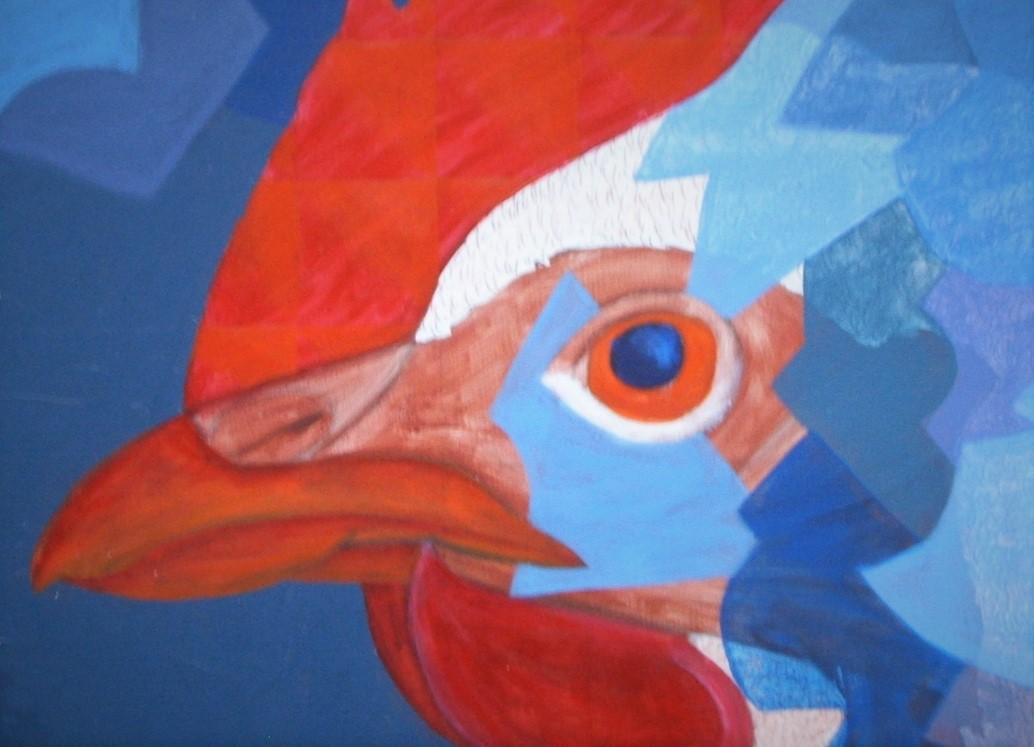WEST GERMANIC
Cacophony of cackle
Linguistics
| 21-11-2020
Every weekday morning I make the four workday assignments of beterspellen.nl during breakfast. Recently, one of the exercises was about the spelling of the word kakofonie (cacophony), including the option 'kakelfonie' ('cacklephony'). That contraction of kakelen (cackle) and kakofonie made me think: would there be a relationship between those two words? It wouldn't surprise me.

Noise chaos
A kakofonie is a chaotic whole of all kinds of sounds mixed together. When many people talk together so that it becomes one busy mash of sounds, this is sometimes called gekakel (cackling), which is derived from kakelen. This is not only the case in Dutch, but also applies to the Frisian keakelje, which in addition to 'the natural sound of chickens' also means'to talk loud and busy', and to the German gackeln which is used 'disparagingly' for 'giggle, chatting', again referring to the chicken sound. The words kakofonie and kakelen are therefore somewhat similar in meaning, and in addition, both words of course start with the same sounds. Hence the question: does the origin of kakofonie also have something to do with that of kakelen?
Yapping, snarling, kaken
How the word kakelen came about is not entirely clear. The Etymological Dictionary of Dutch (EWN) indicates that it is probably an onomatopoeic word, something the Online Etymology Dictionary subscribes at the related word cackle: “imitative word of the noise of a hen”. Remarkably, in a source from 1477, the Dutch word cakelen was still used for the yapping of dogs or the snarling of people. With that I cannot imagine the onomatopoeia as well as with the chicken sound, to which kakelen or kekelen refers, according to sources from 1488 onwards. The OED adds something interesting: “perhaps partly based on Middle Dutch kake 'jaw', with frequentative suffix -el”. When you imitate the sound of a chicken, you move your jaws up and down more or less rhythmically, so it makes sense to call that 'kaken ('jawing') with an inserted -el to indicate it is happening repeatedly. This explanation also makes kakelen as a word for dog yapping or people's snarling more logical, as far as I'm concerned.
Kaak
In order to determine whether kakelen is related to kakofonie, we need to know where that first word derives from. I don't find the reference to kaak in the EWN, but The Dutch Etymological Dictionary (J. de Vries, 1971) does mention it, and I think it is an interesting track to follow.
The word kaak in the meaning 'mouth bone' was still kāke in Middle Dutch, but that schwa at the end, like in many Dutch words, has disappeared at a certain point. Etymological dictionaries usually name one basic word form from which the word originates, but in this case there are many variations: *kēka-, *kekō-, *kōkō-, *keuk- and *kaukō-. From these Protogerman word stems, a lot of variants with different vowel combinations have been derived in the various stages of Low German, Swedish, Norwegian, Frisian, Dutch and English. Indeed, all Germanic languages. No related words are known outside of Germanic, which could mean that the words are derived from one or more languages spoken in this part of Europe before Germanic became common.
Kakóphōnos
The origin of kakofonie is unclear as well – at least of the part kako-. We obviously know the suffix -fonie (-phony) from words such as telephony and symphony, and in slightly different forms from xylophone and dictaphone, for example. It all comes from the Greek phōnḗ, which means 'sound, voice', and on which in linguistics, among other things, the word fonetisch (phonetic) is based.
The morpheme kako- is known to be formed from kakós, Greek for 'bad, evil', but how that word originated is unclear, according to the EWN. However, according to the description at cacophony in the OED, it comes from the Proto-Indo-European tribe *kakka-, which means "to defecate". In Dutch, that's kakken in coarse language. This is probably an onomatopoeic word from child speak, according to one Watkins as "imitative of glottal closure during defecation". The glottis is a part of the speech organ, which you close when you make the 'k' sound, among other things. And that's pretty close to imitating the sound of chickens, depending on how you do that, of course.
Too much and too little
It goes far too far to now, in one big step, connect all variants of the precursors of kaak to the sound you make when closing your glottis, which may be the origin of a word that's probably a onomatpoeic word from child speak. On the other hand, I find the similarities – moving your jaw up and down and making a 'ka' sound repeatedly – too remarkable to ignore altogether. Especially because there are so many different proto-stems in the origin of kaak and related words in other languages. There is too much unclear, as far as I am concerned, to rule it out. On the other hand, too little is clear to confirm a link between kakofonie and kakelen (or cacophony and cackling). So this piece doesn't really have a clear conclusion, my question remains unanswered. Kak!

Noise chaos
A kakofonie is a chaotic whole of all kinds of sounds mixed together. When many people talk together so that it becomes one busy mash of sounds, this is sometimes called gekakel (cackling), which is derived from kakelen. This is not only the case in Dutch, but also applies to the Frisian keakelje, which in addition to 'the natural sound of chickens' also means'to talk loud and busy', and to the German gackeln which is used 'disparagingly' for 'giggle, chatting', again referring to the chicken sound. The words kakofonie and kakelen are therefore somewhat similar in meaning, and in addition, both words of course start with the same sounds. Hence the question: does the origin of kakofonie also have something to do with that of kakelen?
Yapping, snarling, kaken
How the word kakelen came about is not entirely clear. The Etymological Dictionary of Dutch (EWN) indicates that it is probably an onomatopoeic word, something the Online Etymology Dictionary subscribes at the related word cackle: “imitative word of the noise of a hen”. Remarkably, in a source from 1477, the Dutch word cakelen was still used for the yapping of dogs or the snarling of people. With that I cannot imagine the onomatopoeia as well as with the chicken sound, to which kakelen or kekelen refers, according to sources from 1488 onwards. The OED adds something interesting: “perhaps partly based on Middle Dutch kake 'jaw', with frequentative suffix -el”. When you imitate the sound of a chicken, you move your jaws up and down more or less rhythmically, so it makes sense to call that 'kaken ('jawing') with an inserted -el to indicate it is happening repeatedly. This explanation also makes kakelen as a word for dog yapping or people's snarling more logical, as far as I'm concerned.
Kaak
In order to determine whether kakelen is related to kakofonie, we need to know where that first word derives from. I don't find the reference to kaak in the EWN, but The Dutch Etymological Dictionary (J. de Vries, 1971) does mention it, and I think it is an interesting track to follow.
The word kaak in the meaning 'mouth bone' was still kāke in Middle Dutch, but that schwa at the end, like in many Dutch words, has disappeared at a certain point. Etymological dictionaries usually name one basic word form from which the word originates, but in this case there are many variations: *kēka-, *kekō-, *kōkō-, *keuk- and *kaukō-. From these Protogerman word stems, a lot of variants with different vowel combinations have been derived in the various stages of Low German, Swedish, Norwegian, Frisian, Dutch and English. Indeed, all Germanic languages. No related words are known outside of Germanic, which could mean that the words are derived from one or more languages spoken in this part of Europe before Germanic became common.
Kakóphōnos
The origin of kakofonie is unclear as well – at least of the part kako-. We obviously know the suffix -fonie (-phony) from words such as telephony and symphony, and in slightly different forms from xylophone and dictaphone, for example. It all comes from the Greek phōnḗ, which means 'sound, voice', and on which in linguistics, among other things, the word fonetisch (phonetic) is based.
The morpheme kako- is known to be formed from kakós, Greek for 'bad, evil', but how that word originated is unclear, according to the EWN. However, according to the description at cacophony in the OED, it comes from the Proto-Indo-European tribe *kakka-, which means "to defecate". In Dutch, that's kakken in coarse language. This is probably an onomatopoeic word from child speak, according to one Watkins as "imitative of glottal closure during defecation". The glottis is a part of the speech organ, which you close when you make the 'k' sound, among other things. And that's pretty close to imitating the sound of chickens, depending on how you do that, of course.
Too much and too little
It goes far too far to now, in one big step, connect all variants of the precursors of kaak to the sound you make when closing your glottis, which may be the origin of a word that's probably a onomatpoeic word from child speak. On the other hand, I find the similarities – moving your jaw up and down and making a 'ka' sound repeatedly – too remarkable to ignore altogether. Especially because there are so many different proto-stems in the origin of kaak and related words in other languages. There is too much unclear, as far as I am concerned, to rule it out. On the other hand, too little is clear to confirm a link between kakofonie and kakelen (or cacophony and cackling). So this piece doesn't really have a clear conclusion, my question remains unanswered. Kak!
WEST GERMANIC
In the West Germanic section, I regularly discuss a word that strikes me. I look at the meanings and forms of the word, and especially at where the word originates from. With that I compare the four West Germanic languages Dutch, English, Frisian and German, with the occasional inevitable trip across the fictional West Germanic border.
Sources
- Etymological dictionaries: etymologiebank.nl, dwds.de, etymonline.com.
- The Wurdboekportaal at Taalweb Frysk.
- Image: own work (detail of an unfinished painting, 2008).
